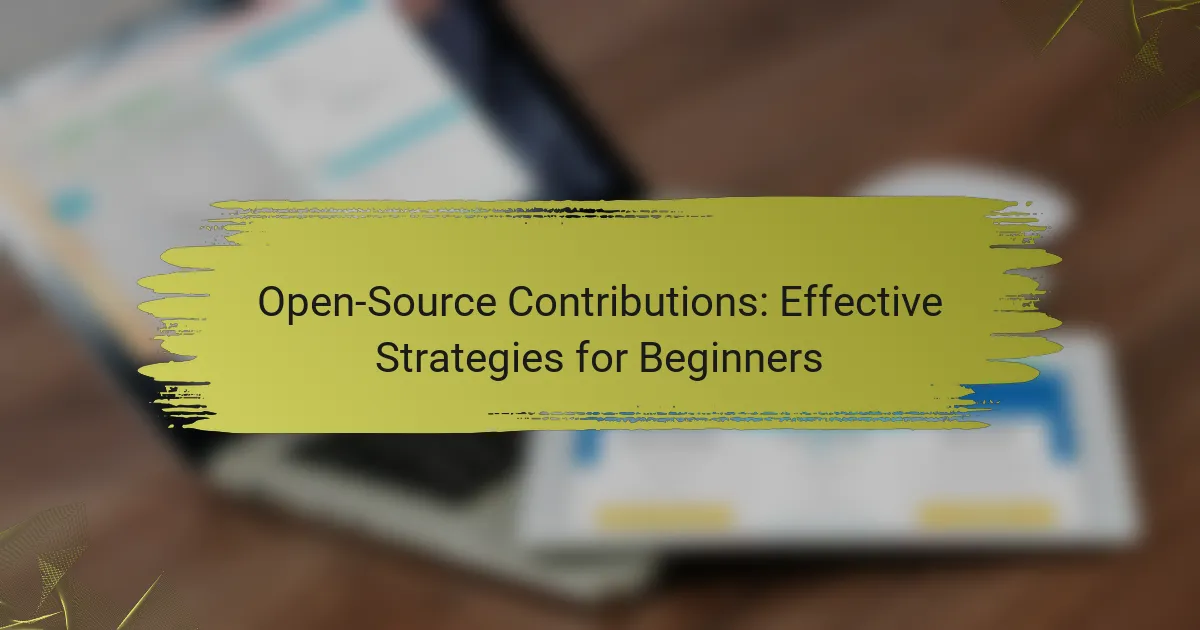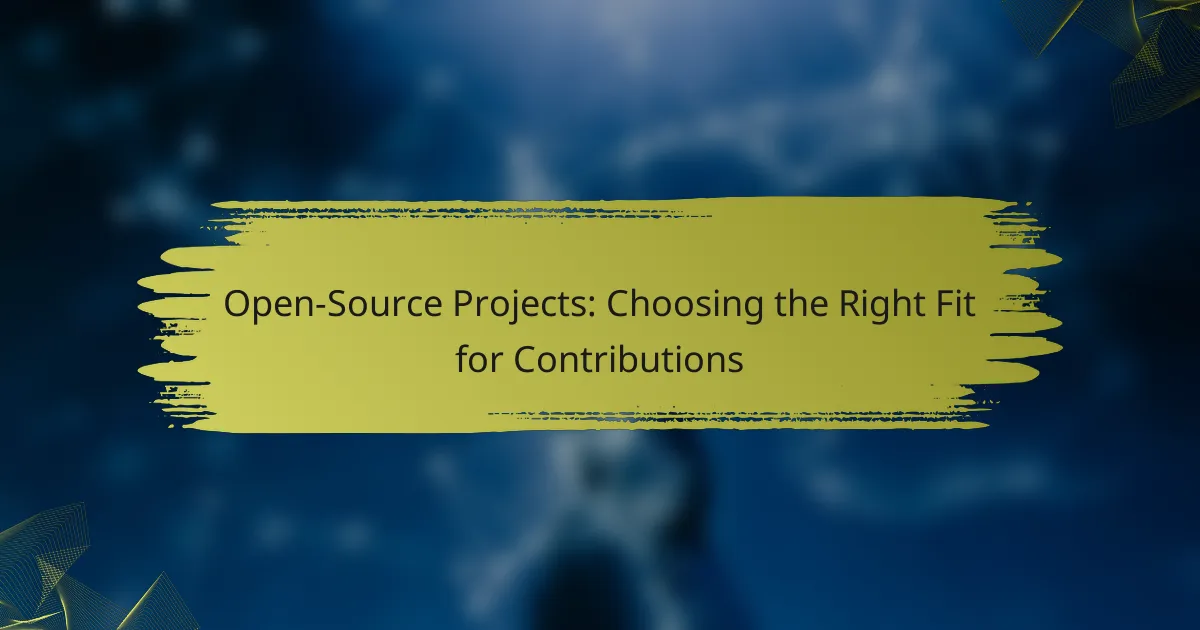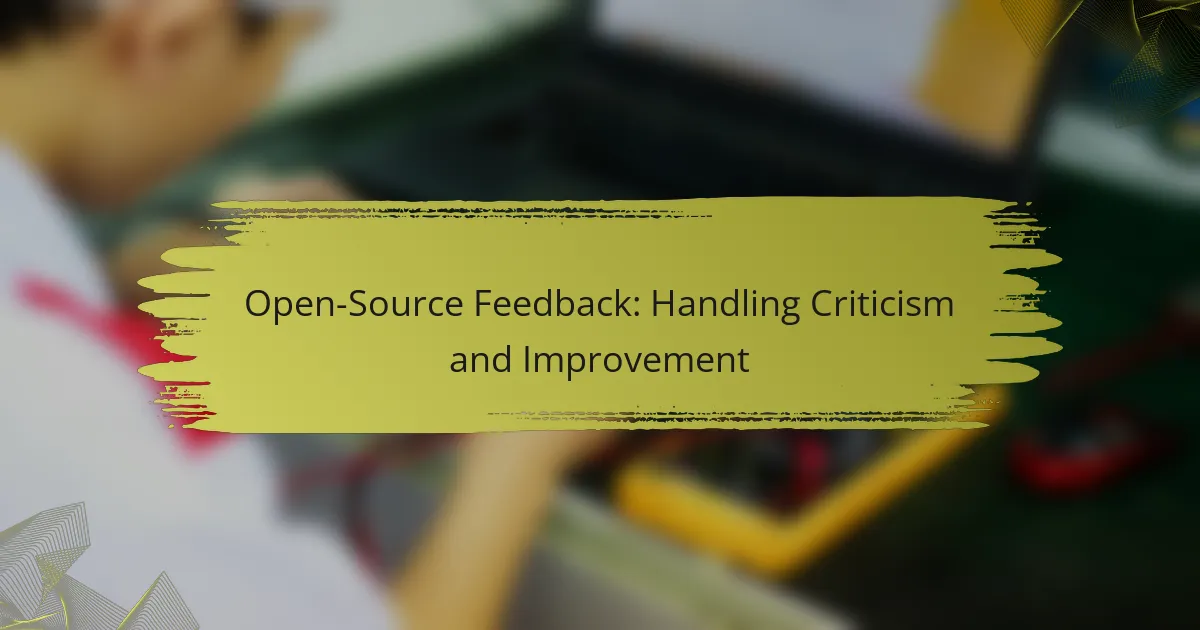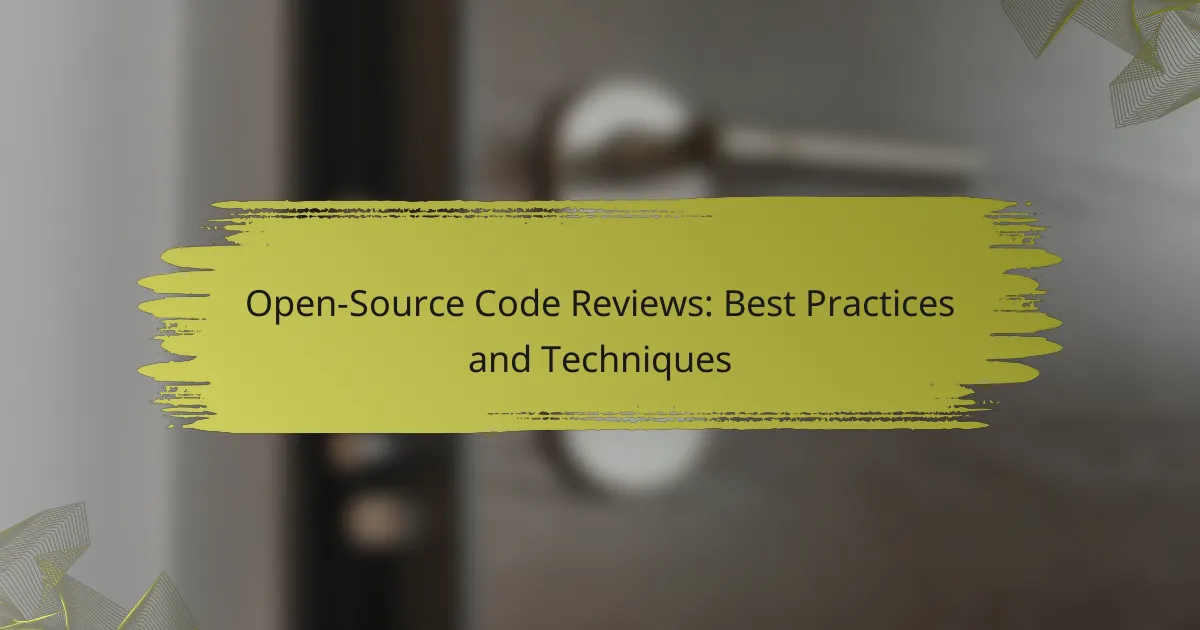Open-source contributions offer a valuable opportunity for beginners to enhance their skills and engage with a vibrant community. By focusing on improving documentation, participating in discussions, and exploring platforms like GitHub and GitLab, newcomers can make meaningful contributions while building confidence. Developing basic programming skills and understanding version control are essential steps toward effective participation in these collaborative projects.
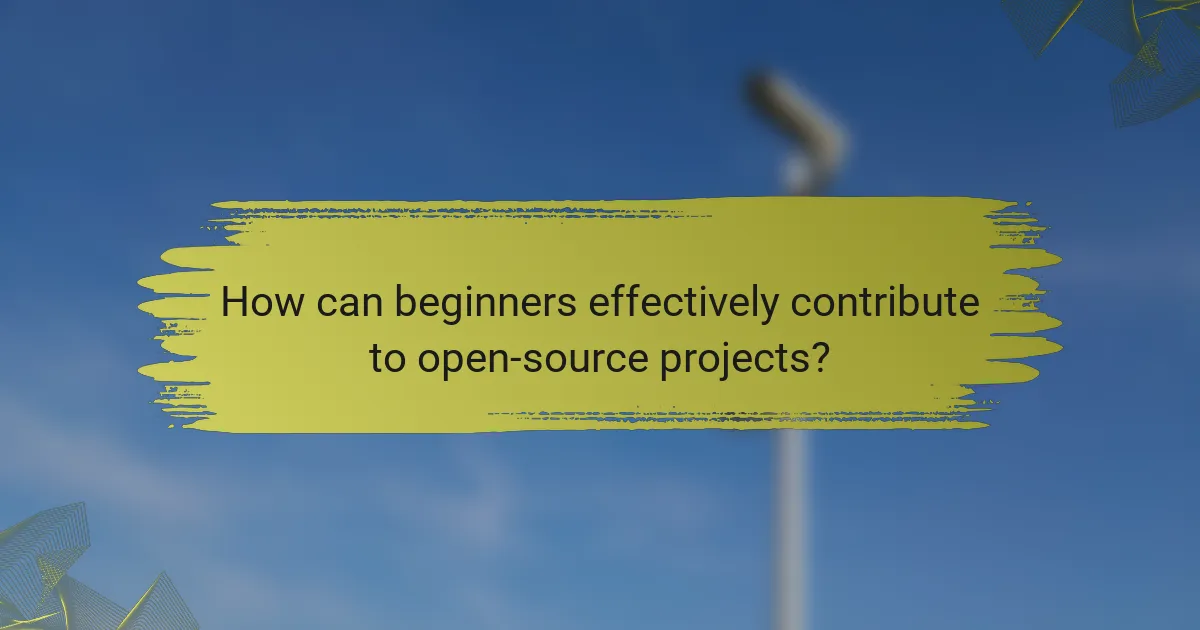
How can beginners effectively contribute to open-source projects?
Beginners can effectively contribute to open-source projects by engaging with existing initiatives, improving documentation, and participating in community discussions. These strategies help newcomers build skills, gain confidence, and make meaningful contributions.
Engage with existing projects
To start contributing, find projects that align with your interests or skills. Browse platforms like GitHub to discover repositories that are actively maintained and have a welcoming community. Engaging with these projects allows you to understand their structure and coding standards.
Read through the project’s README file and issues to identify areas where you can help. Consider starting with small tasks, such as fixing bugs or adding features that are clearly outlined by the maintainers.
Start with documentation improvements
Improving documentation is a valuable way to contribute, especially for beginners. Many projects need clearer instructions, better examples, or updated information. Look for issues labeled “documentation” or “help wanted” to find tasks that require attention.
Focus on enhancing clarity and usability. For example, you could rewrite sections that are confusing or add usage examples to help new users understand the project better.
Participate in community discussions
Joining community discussions is crucial for understanding the project’s goals and challenges. Most open-source projects have forums, chat channels, or mailing lists where contributors can ask questions and share ideas. Engaging in these discussions helps you learn from experienced contributors.
Be respectful and open-minded when participating. Share your thoughts, ask for feedback, and offer assistance where you can. This interaction builds relationships and fosters a collaborative environment.
Choose beginner-friendly repositories
Selecting beginner-friendly repositories can significantly enhance your contribution experience. Look for projects that explicitly welcome newcomers, often indicated by labels like “good first issue” or “beginner-friendly.” These projects typically have clear guidelines and supportive communities.
Consider the size and activity level of the repository as well. Smaller projects may offer more opportunities for direct interaction with maintainers, while larger projects might have more extensive documentation and resources available.
Utilize GitHub for collaboration
GitHub is a powerful platform for collaborating on open-source projects. Familiarize yourself with its features, such as forking repositories, creating branches, and submitting pull requests. These tools facilitate effective collaboration and version control.
When making contributions, ensure your code adheres to the project’s coding standards. Write clear commit messages and provide context for your changes in pull requests. This practice helps maintainers understand your contributions and increases the likelihood of acceptance.
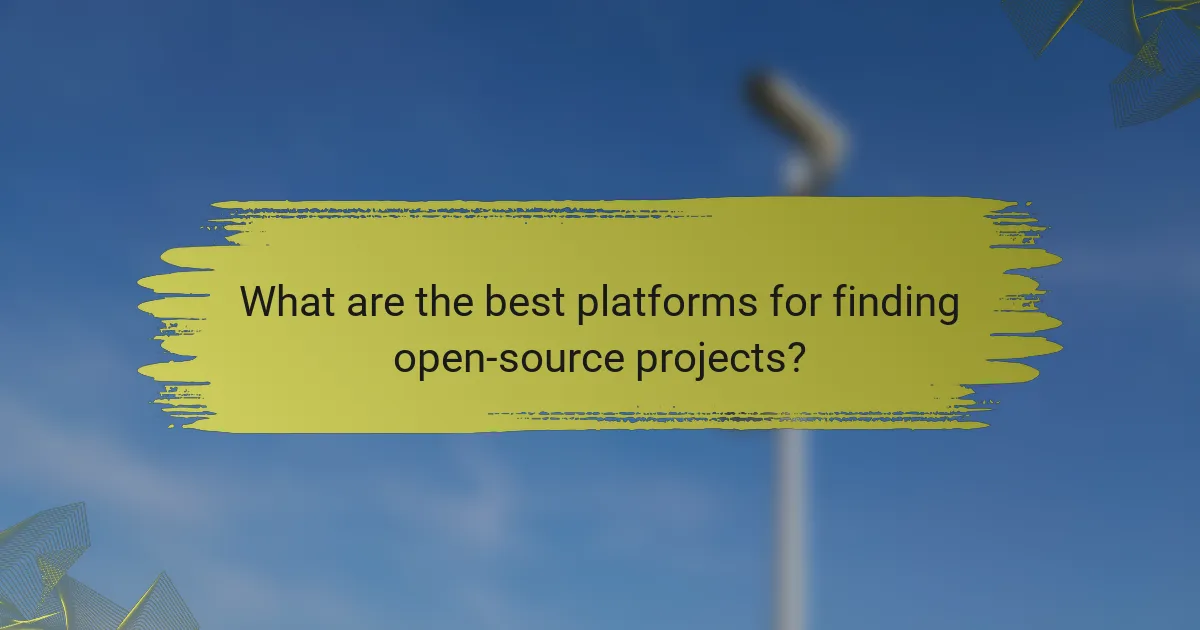
What are the best platforms for finding open-source projects?
The best platforms for finding open-source projects include GitHub, GitLab, and SourceForge. Each platform caters to different types of projects and communities, making them suitable for various skill levels and interests.
GitHub as a primary resource
GitHub is the most popular platform for open-source contributions, hosting millions of projects across diverse fields. It offers a user-friendly interface, robust search features, and a large community, making it ideal for beginners looking to get involved.
To start, create an account and explore trending repositories or use the search function to find projects that match your interests. Look for repositories labeled with “good first issue” to find beginner-friendly tasks.
GitLab for diverse projects
GitLab serves as an excellent alternative to GitHub, featuring a wide variety of projects, including those focused on DevOps and CI/CD. Its integrated tools for project management and collaboration make it appealing for contributors who want to engage in more structured environments.
When using GitLab, consider joining groups that align with your skills or interests. This can help you connect with other contributors and find projects that are actively seeking help.
SourceForge for legacy projects
SourceForge is known for hosting older and legacy open-source projects that may not be available on newer platforms. It can be a valuable resource for those interested in maintaining or reviving established software.
To find projects on SourceForge, use the search bar or browse through categories. Pay attention to project activity levels, as some may be outdated or lack active maintainers.
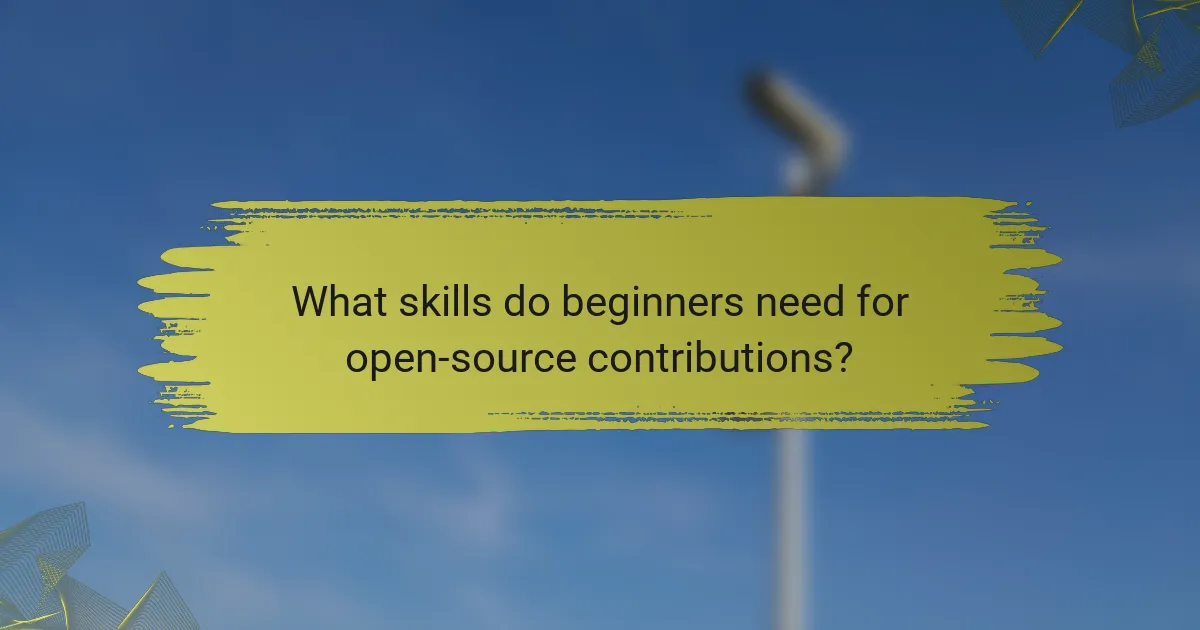
What skills do beginners need for open-source contributions?
Beginners in open-source contributions should focus on developing basic programming skills, understanding version control systems, and becoming familiar with project management tools. These skills form the foundation for effective participation in open-source projects.
Basic programming knowledge
Having basic programming knowledge is essential for contributing to open-source projects. Familiarity with at least one programming language, such as Python, JavaScript, or Java, allows you to understand the codebase and make meaningful contributions.
Start by working on small tasks or fixing bugs in existing projects. This hands-on experience will help you build confidence and improve your coding skills. Online platforms like GitHub often label issues as “good first issue” to guide beginners.
Understanding version control systems
Version control systems, particularly Git, are crucial for managing changes in code. Knowing how to clone repositories, create branches, and submit pull requests enables you to collaborate effectively with other developers.
Familiarize yourself with basic Git commands such as git commit, git push, and git pull. Many resources, including free online tutorials, can help you learn these commands and understand the workflow of contributing to projects.
Familiarity with project management tools
Project management tools like Jira, Trello, or GitHub Projects help organize tasks and track progress in open-source projects. Understanding how to use these tools can enhance your ability to collaborate and stay aligned with project goals.
Learn how to navigate these platforms to view issues, assign tasks, and update the status of your contributions. Engaging with these tools will streamline your workflow and improve communication with project maintainers and other contributors.
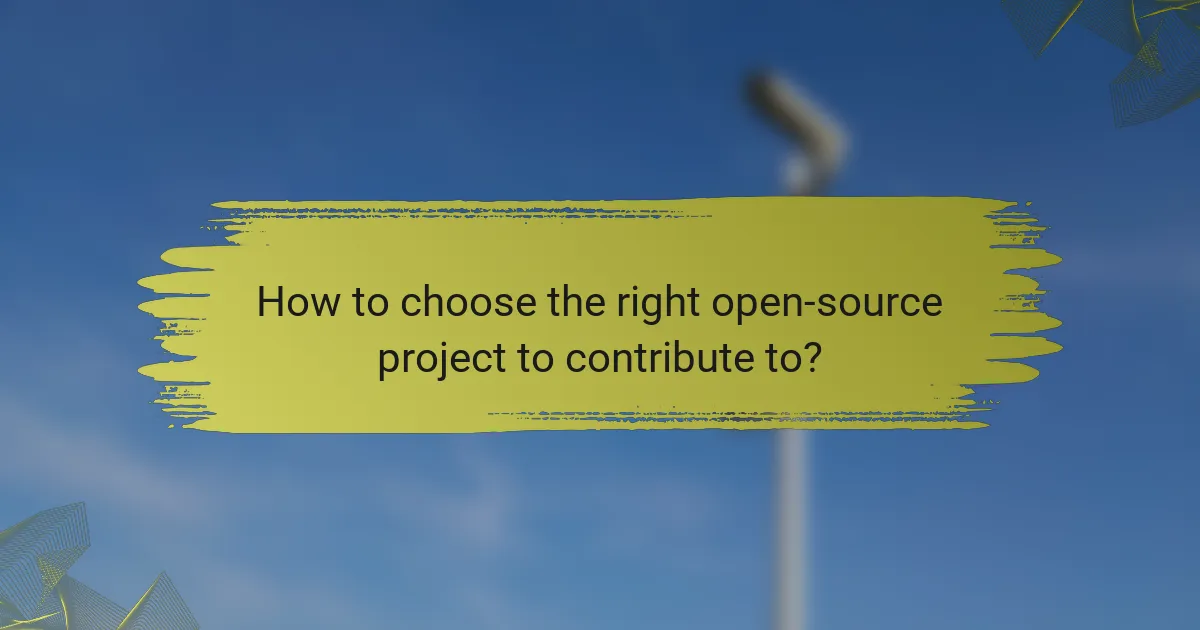
How to choose the right open-source project to contribute to?
Choosing the right open-source project involves assessing its activity level, community engagement, and alignment with your skills and interests. A good fit will enhance your contribution experience and foster growth in your abilities.
Assess project activity and community
Start by examining the project’s activity metrics, such as the frequency of commits, pull requests, and issue resolutions. A project that is actively maintained typically has regular updates and a responsive community, which can provide support and feedback.
Look for community engagement indicators, such as the number of contributors and discussions in forums or chat channels. A vibrant community can make your contributions more impactful and enjoyable.
Evaluate your interest and expertise
Consider your own interests and expertise when selecting a project. Choose a project that aligns with your passions or career goals, as this will keep you motivated and engaged.
Assess your skill level against the project’s requirements. If you’re a beginner, look for projects that welcome newcomers and offer mentorship opportunities. Projects with clear documentation and beginner-friendly issues are ideal starting points.
Check for contribution guidelines
Before diving in, review the project’s contribution guidelines. These guidelines outline the process for submitting changes, coding standards, and other expectations. Familiarizing yourself with these rules can help you avoid common pitfalls.
Many projects provide a “CONTRIBUTING.md” file or similar documentation. Make sure to follow these guidelines closely, as adhering to them increases the likelihood of your contributions being accepted and appreciated by the community.
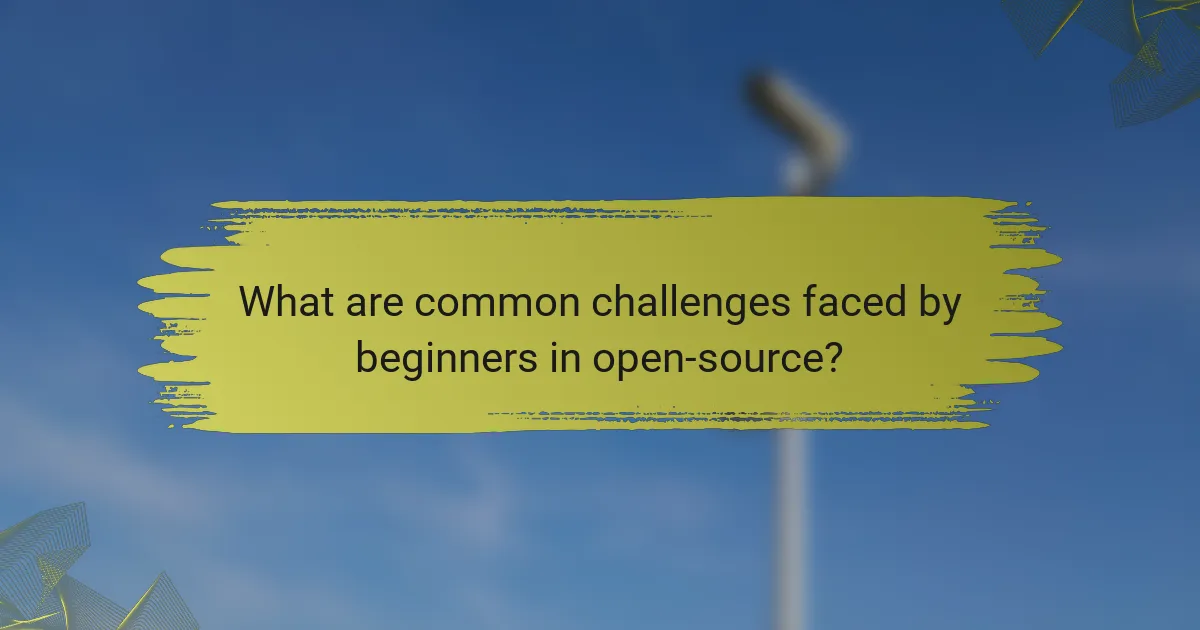
What are common challenges faced by beginners in open-source?
Beginners in open-source often encounter challenges such as navigating complex codebases, understanding contribution processes, and overcoming imposter syndrome. These hurdles can hinder their ability to effectively contribute and feel confident in their skills.
Navigating complex codebases
Complex codebases can be overwhelming for newcomers due to their size and intricacy. Beginners should start by familiarizing themselves with the project’s structure, including key files and directories, to build a foundational understanding.
A practical approach is to read the documentation, which often includes guides on the codebase layout and common workflows. Engaging with the community through forums or chat channels can also provide insights and support.
Understanding contribution processes
Each open-source project has its own contribution process, which can vary significantly. Beginners should carefully review the project’s contribution guidelines, typically found in a CONTRIBUTING.md file, to understand how to submit changes correctly.
Common steps include forking the repository, creating a feature branch, and submitting a pull request. It’s essential to follow coding standards and provide clear commit messages to facilitate the review process.
Overcoming imposter syndrome
Imposter syndrome is a common feeling among beginners, leading them to doubt their abilities and contributions. Recognizing that many experienced contributors once felt the same way can help alleviate these feelings.
To combat imposter syndrome, beginners should focus on small, manageable contributions that build their confidence over time. Participating in mentorship programs or seeking feedback from peers can also provide encouragement and validation.
